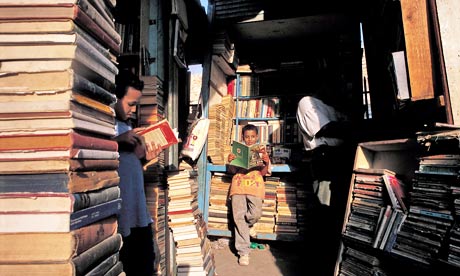
The South African writer Mike Nicol once told me that when he started writing back in the 80s, he had read most of the books published in his country. I knew what he meant. Every time I walk into any city – whether it's Accra, Algiers, Johannesburg or Nairobi – the first place I want to find is a bookstore, and the first section I seek is the tiny little section labelled Africana/African Literature/African writers. Nine times out of 10 I used to find that I had read every book on the shelf. That is not the case any more. African bookstores continent-wide may prefer stocking Grisham, Picoult, Steel and self-help galore, but these days I always find something new from an African writer.
Here's a personal selection of some authors beyond the two or three African writers whose names come up every time African writers are discussed. They cover a broad range of subjects and genres, but they are all writers who challenge themselves and go the next step with each story.
Miano's 2005 novel L'intérieur de la nuit (translated by Tamsin Black as In the Dark Heart of the Night) tells the story of a a woman who returns from France to her fictional African village to visit her ill mother. Ostracised by the villagers as a "foreigner" and for failing to bring presents, she decides to leave, but on the eve of her departure a guerrilla group raids her village and uses some twisted form of Pan-Africanism as a way of subjugating the villagers. Miano disliked this English translation, as did many of my French-speaking friends who had read the original novel, and their disapproval compelled me to buy it. I was curious to know just how bad the translation was – and as it turned out, I enjoyed it. If In the Dark Heart of the Night is a bad translation, I would like to read the good translations of all her other work because this Cameroon-born Afro-pean writer, now based in France, is brilliant!
2. HJ Golakai
Two years ago, my South African publisher sent me a manuscript from a Liberian writer. It wasn't perfect, but The Lazarus Effect had a lot going for it. I not only gave my response to the publisher but also searched for HJ's number, called her, and like a groupie told her how much I liked what I had read. Earlier this year, HJ's book was shortlisted for South Africa's premier literary prize, The Alan Paton Award. Crime fiction doesn't often make it on to this list, but the beauty of HJ's writing is that she achieves the rare feat of balancing the book as pop and literary fiction. This may be HJ's first book but if the unpublished prose that I have read is any indication, she is going far.
3. Ondjaki
This Angolan writer, who studied in Lisbon and now lives in Rio de Janeiro, is one of the most prolific writers I know. Good Morning, Comrades tells the story of a young boy growing up in post-civil war Luanda. When his aunt comes to visit from Portugal, he learns that there is a world beyond his home city, one in which people are unafraid and ration cards don't exist. In The Whistler, a traveller walks into a village, visits the church, and soon impresses everyone with his whistling skills. Ondjaki's writing and storylines are deceptively simple but highly entertaining.
4. Chika Unigwe
Before Alastair Campbell tweeted "the best novel so far read this summer", I had read Unigwe's On Black Sisters' Street and loved it. It's the story of four very different women who have all left Africa for Europe in pursuit of wealth and happiness, but whose dreams have collided with the nightmare of Belgium's red light districts, forcing them to reforge their identities by retelling the stories of who they are.
A few years ago when Mgqolozana's first book, A Man Who's Not a Man, was published, a South African traditional leader suggested that it should be burnt. That would be a good reason in itself to read Mgqolozana's books, but an even better one is that his prose is as captivating as his plots are controversial. For all the difficult subjects that he explores in his fiction (circumcision in A Man Who's Not a Man, and the virgin birth in the more recent novel Hear Me Alone) he never seems to preach but rather asks the reader to question her or his truth.

